| Listing 1 - 10 of 24 | << page >> |
Sort by
|
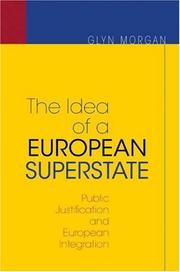
ISBN: 9786612158629 9781400828050 0691122466 069113412X 1282158627 1400828058 9780691122465 9780691134123 Year: 2005 Publisher: Princeton (N.J.) Princeton University Press
Abstract | Keywords | Export | Availability | Bookmark
 Loading...
Loading...Choose an application
- Reference Manager
- EndNote
- RefWorks (Direct export to RefWorks)
Is there a justification for European integration? The Idea of a European Superstate examines this--the most basic--question raised by the European Union. In doing so, Glyn Morgan assesses the arguments put forward by eurosceptics and their critics. In a challenge to both sides of the debate, Morgan argues in support of a European superstate. Unless Europe forms a unitary sovereign state, Europe will remain, so he maintains, weak and dependent for its security on the United States. The Idea of a European Superstate reshapes the debate on European political integration. It throws down a gauntlet to eurosceptics and euro-enthusiasts alike. While employing the arguments of contemporary political philosophy and international relations, this book is written in an accessible fashion that anyone interested in European integration can understand.
European Union --- 341.2422 --- E-books --- European Union. --- Government - Europe --- Government - Non-U.S. --- Law, Politics & Government --- E.U. --- European federation --- Construction européenne --- POLITICAL SCIENCE / History & Theory.
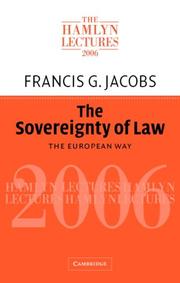
ISBN: 9780521878876 9780521703857 052187887X 0521703859 9780511493706 1107183626 9786610959792 0511295901 1139133233 0511295111 0511493703 1280959797 0511294336 0511296657 9780511296659 9780511295904 9781107183629 9781280959790 661095979X 9781139133234 9780511295119 9780511294334 Year: 2007 Volume: 2006 Publisher: Cambridge : Cambridge University Press,
Abstract | Keywords | Export | Availability | Bookmark
 Loading...
Loading...Choose an application
- Reference Manager
- EndNote
- RefWorks (Direct export to RefWorks)
Recently, the role of courts has changed dramatically. Not only do courts now have to decide cases between parties, they also often have to choose between competing fundamental values. Judges may have to balance the potentially conflicting interests of human life and human dignity; freedom of speech and the right of privacy; or free trade and the protection of the environment. The courts may have to circumscribe freedom of religion, and decide when religious dress may be worn. With the non-specialist in mind, and starting from the basic notion of the rule of law, this book explores how judges can and should address such issues. Both the European Convention on Human Rights and the European Union often play a decisive role, and the book points out both the advantages and the difficulties posed by this. Above all, it seeks to promote a more informed debate.
Human rights --- Legal theory and methods. Philosophy of law --- European Union --- Rule of law --- -Rule of law --- -341.2422 --- Uc2 --- Supremacy of law --- Administrative law --- Constitutional law --- 341.2422 --- Law --- General and Others --- Rule of law - Europe --- Rule of law - European Union countries
Book
ISBN: 9780521514811 0521514819 9780511575235 9781107404427 0511464517 9780511464515 9780511465253 0511465254 9780511462948 0511462948 0511575238 1107190312 9781107190313 1281982679 9781281982674 9786611982676 6611982671 0511462182 9780511462184 0511463731 9780511463730 1107404428 Year: 2009 Publisher: Cambridge, UK ; New York : Cambridge University Press,
Abstract | Keywords | Export | Availability | Bookmark
 Loading...
Loading...Choose an application
- Reference Manager
- EndNote
- RefWorks (Direct export to RefWorks)
Each wave of expansion of the European Union has led to political tensions and conflict. Existing members fear their membership privileges will diminish and candidates are loath to concede the expected benefits of membership. Despite these conflicts, enlargement has always succeeded - so why does the EU continue to admit new states even though current members might lose from their accession? Combining political economy logic with statistical and case study analyses, Christina J. Schneider argues that the dominant theories of EU enlargement ignore how EU members and applicant states negotiate the distribution of enlargement benefits and costs. She explains that EU enlargement happens despite distributional conflicts if the overall gains of enlargement are redistributed from the relative winners among existing members and applicants to the relative losers. If the overall gains from enlargement are sufficiently great, a redistribution of these gains will compensate losers, making enlargement attractive for all states.
European Union --- Membership --- Membership. --- 341.2422 --- Conflict management --- Conflict control --- Conflict resolution --- Dispute settlement --- Management of conflict --- Managing conflict --- Management --- Negotiation --- Problem solving --- Social conflict --- Crisis management --- E.U. --- Social Sciences --- Political Science
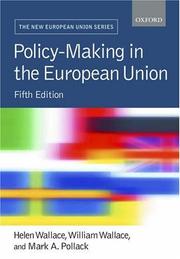
ISBN: 0199276129 9780199276127 1423724674 9781423724674 Year: 2005 Publisher: Oxford: Oxford university press,
Abstract | Keywords | Export | Availability | Bookmark
 Loading...
Loading...Choose an application
- Reference Manager
- EndNote
- RefWorks (Direct export to RefWorks)
The processes of European policy-making have become much more complex in recent years. This edition has been fully revised to reflect changes such as the enlargement of the Union and the expanded roles of the Court of Justice and European Parliament. It brings the reader up-to-date with the range of core policy challenges facing the European Union and the ways in which they are being addressed.
International economic relations --- Economic policy and planning (general) --- European Union --- Political planning --- Politique publique --- Policy sciences --- Europe --- Politics and government --- European Union. --- -#SBIB:327.7H230 --- #SBIB:327.7H220 --- europese instellingen --- politique --- -341.2422 --- Ui1.f --- Planning in politics --- Public policy --- Planning --- Politics, Practical --- Public administration --- Europese Unie: beleid: algemeen --- Europese Unie: instellingen en besluitvorming --- institutions europeennes --- politiek --- 341.2422 --- #SBIB:327.7H230 --- E.U. --- Government - Europe --- Government - Non-U.S. --- Law, Politics & Government --- Political planning - European Union countries --- Acqui 2006 --- Europe - Politics and government - 1989 --- -Economic policy and planning (general) --- -Political planning
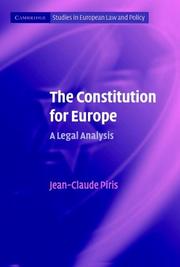
ISBN: 0521682185 9780521682183 0521863538 9780521863537 9780511616518 1107156645 0511168861 0511169299 0511313306 0511616511 1280436980 0511167938 0511168438 9780511168864 9780511169298 9780511167935 9780511168437 9786610436989 6610436983 9781107156647 9781280436987 9780511313301 Year: 2006 Publisher: Cambridge, UK ; New York : Cambridge University Press,
Abstract | Keywords | Export | Availability | Bookmark
 Loading...
Loading...Choose an application
- Reference Manager
- EndNote
- RefWorks (Direct export to RefWorks)
There is much confusion over the 'Constitution', and this book provides an in-depth legal analysis of the institutional aspects of the Constitutional Treaty which, if ratified by the 25 EU Member States, would govern the European Union. Piris argues that, despite its ratification being rejected by the French and the Netherlands referenda in 2005, the Treaty should not be discarded, as it will inevitably be the point of departure for the future of European integration. He places this analysis in an historical and political context and explains the origin, meanings and legal and political effects of all proposed changes to the present treaties.
Public law. Constitutional law --- European law --- European Union --- Constitutions --- Constitutional law --- Droit constitutionnel --- Treaty Establishing a Constitution for Europe --- European Union. --- -341.2422 --- Ud3 --- Constitutional limitations --- Constitutionalism --- Limitations, Constitutional --- Public law --- Administrative law --- Interpretation and construction --- 341.2422 --- Associations, institutions, etc. --- Law --- EU Constitutional Treaty --- TECE --- Traité de Rome de 2004 --- Traité établissant une constitution pour l'Europe --- Tratado por el que se establece una constitución para Europa --- Trattato che adotta una costituzione per l'Europa --- Vertrag über eine Verfassung für Europa --- General and Others --- Constitutions - European Union countries --- Constitutional law - European Union countries --- Acqui 2006
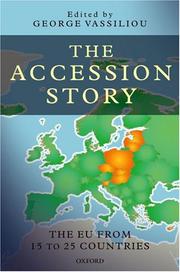
ISBN: 0199215871 9780199215874 9786611149482 0191527025 1281149489 1429488786 9780191527029 6611149481 9781281149480 9781429488785 1383035431 Year: 2007 Publisher: Oxford Oxford University Press
Abstract | Keywords | Export | Availability | Bookmark
 Loading...
Loading...Choose an application
- Reference Manager
- EndNote
- RefWorks (Direct export to RefWorks)
The first half of this book provides a unique overview of the enlargement process from the point of view of Brussels. The second part is an extraordinary historical record of the process from the point of view of each of the chief negotiators involved.
Europe -- Economic integration -- History. --- European Union -- History. --- European Union. --- Business & Economics --- Economic History --- European Union --- History. --- Europe --- Economic integration --- 341.2422 --- History --- Electronic information resources. --- Council of Europe countries --- Eastern Hemisphere --- Eurasia --- -History --- -Electronic information resources. --- E-books --- E.U. --- European law
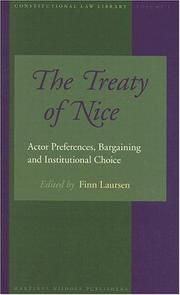
ISBN: 9004148205 9786612396533 1282396536 9047417488 9789047417484 9789004148208 9781282396531 6612396539 Year: 2006 Publisher: Leiden [Netherlands] Boston Martinus Nijhoff
Abstract | Keywords | Export | Availability | Bookmark
 Loading...
Loading...Choose an application
- Reference Manager
- EndNote
- RefWorks (Direct export to RefWorks)
Giving an analysis of the making of the Treaty of Nice, the treaty of the European Union, adopted in 2000. This book analyses the interests and strategies of the various actors, including the 15 Member States, during the negotiations and tries to explain the main institutional changes, such as the re-weighting of votes in the Council of Ministers.
International relations. Foreign policy --- European law --- Pouvoir exécutif --- Pouvoir législatif --- Union européenne. Conseil européen --- Union européenne. Commission européenne --- Histoire --- Executive power --- -Legislative power --- -341.2422 --- Uc1.2.3.f --- Power, Legislative --- Constitutional law --- Implied powers (Constitutional law) --- Judicial review --- Legislation --- Legislative bodies --- Separation of powers --- State governments --- Emergency powers --- Power, Executive --- Presidents --- Political science --- History --- Powers --- European Council --- European Communities. Commission --- Commission of the European Communities --- Europese Gemeenschappen. Commissie --- European Economic Community. --- Conseil européen --- Council of the European Union --- History. --- Treaty on European Union --- Traité de Nice --- Traktat Nicejski --- Tratado de Nice --- Tratado de Niza --- Tratatul de la Nisa --- Treaty of Nice --- Vertrag von Nizza --- Legislative power --- European Commission --- 341.2422 --- EC --- Europese Commissie --- Commission européenne
Book
ISBN: 9789004164383 9004164383 9786612397936 1282397931 904743255X 9789047432555 9781282397934 6612397934 Year: 2008 Publisher: Leiden Boston Martinus Nijhoff Publishers
Abstract | Keywords | Export | Availability | Bookmark
 Loading...
Loading...Choose an application
- Reference Manager
- EndNote
- RefWorks (Direct export to RefWorks)
Rules are no longer merely made by states, but increasingly by international organizations and other international bodies. At the same time these rules do impact the daily life of citizens and companies as it has become increasingly difficult to draw dividing lines between international, EU and domestic law. This book introduces the notion of ‘multilevel regulation’ as a way to study these normative processes and the interplay between different legal orders. It indicates that many rules in such areas as trade, financial cooperation, food safety, pharmaceuticals, security, terrorism, civil aviation, environmental protection or the internet find their origin in international cooperation. Apart from mapping multilevel regulation on the basis of a number of case studies, the book analyses its consequences in relation to forms of legal protection and legitimacy. In that respect it proposes an agenda for research to study how to cope with multilevel regulation. This work offers valuable resources for researchers involved in studying the interplay between international, European and domestic law. For practitioners it offers background information on the ways in which many international rules come into being.
International and municipal law --- Law --- International unification --- International unification. --- -Law --- -341.2422 --- Ue2 --- Acts, Legislative --- Enactments, Legislative --- Laws (Statutes) --- Legislative acts --- Legislative enactments --- Jurisprudence --- Legislation --- International law --- Municipal and international law --- -Influence --- International law influences --- -International and municipal law --- International and municipal law -- European Union countries. --- Law -- European Union countries -- International unification. --- Law -- International unification. --- Law - Non-U.S. --- Law - Europe, except U.K. --- Law, Politics & Government --- 341.2422 --- Harmonization of law, International --- International harmonization of law --- International unification of law --- International uniform law --- Unification of law, International --- Uniform law, International --- Innerstaatliches Recht --- Internationales Recht --- Mehrebenen-Verflechtung --- Recht --- Rechtsnorm --- Europäische Union --- International and municipal law - European Union countries --- Law - European Union countries - International unification --- Law - International unification --- Droit international et droit interne --- Droit --- Droit international --- Entraide judiciaire internationale --- Pays de l'Union européenne --- Unification internationale
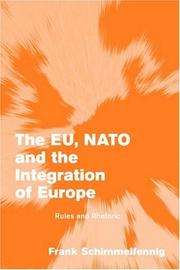
ISBN: 1280421649 0511180381 0511062761 0511204477 0511307322 0511492065 0511071221 110713837X 9780511062766 9780511071225 6610421641 9780521828062 0521828066 9786610421640 0521828066 0521535255 9780511492068 9780521535250 0521535255 Year: 2003 Publisher: Camberidge, UK ; New York : Cambridge University Press,
Abstract | Keywords | Export | Availability | Bookmark
 Loading...
Loading...Choose an application
- Reference Manager
- EndNote
- RefWorks (Direct export to RefWorks)
Why did Western European states agree to the enlargement of the EU and NATO? Frank Schimmelfennig analyzes the history of the enlargement process and develops a theoretical approach of 'rhetorical action' to explain why it occurred. While rationalist theory explains the willingness of East European states to join the NATO and EU, it does not explain why member states decided to admit them. Using original data, Schimmelfennig shows that expansion to the East can be understood in terms of liberal democratic community building. Drawing on the works of Jon Elster and Erving Goffman, he demonstrates that the decision to expand was the result of rhetorical action. Candidates and their supporters used arguments based on collective identity, norms and values of the Western community to shame opponents into acquiescing to enlargement. This landmark book makes an enormous contribution to theory in international relations and to the study of European politics.
National security --- North Atlantic Treaty Organization --- Membership. --- Europe --- Economic integration. --- North Atlantic treaty organisation --- NAVO --- OTAN --- 341.2422 --- #SBIB:327.7H21 --- #SBIB:327.7H32 --- Ontwikkeling van de Europese Unie (historische en toekomstige evolutie) --- Bondgenootschappen: NAVO / NATO --- NATO --- Sécurité nationale --- Intégration économique --- International relations. Foreign policy --- Polemology --- European Union --- Economic integration --- Social Sciences --- Political Science --- National security - Europe --- Europe - Economic integration --- UNION EUROPEENNE --- VIE INTERNATIONALE --- RELATIONS EXTERIEURES --- PESC --- PESD --- POLITIQUE DE SECURITE --- ELARGISSEMENT --- ORGANISATIONS INTERGOUVERNEMENTALES
Periodical
ISSN: 15740196 17445515 Year: 2005 Publisher: The Hague: TMC Asser press,
Abstract | Keywords | Export | Availability | Bookmark
 Loading...
Loading...Choose an application
- Reference Manager
- EndNote
- RefWorks (Direct export to RefWorks)
Public law. Constitutional law --- European law --- internationaal recht --- Constitutional law --- European Union countries --- Politics and government --- Constitutional law. --- Europe. --- -341.2422 --- Z EUCO --- Ud3 --- Constitutional limitations --- Constitutionalism --- Constitutions --- Limitations, Constitutional --- Public law --- Administrative law --- Electronic information resources --- Interpretation and construction --- -EU countries --- Euroland --- Europe --- -Electronic information resources --- E-journals --- Law --- Constitution and Judicial System --- Regional and International Law --- -Constitutional law --- -European Union countries --- -Politics and government --- Periodicals --- Council of Europe countries --- Eastern Hemisphere --- Eurasia --- Droit
| Listing 1 - 10 of 24 | << page >> |
Sort by
|

 Search
Search Feedback
Feedback About UniCat
About UniCat  Help
Help News
News